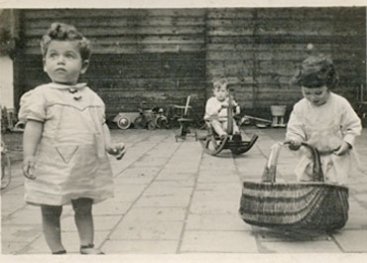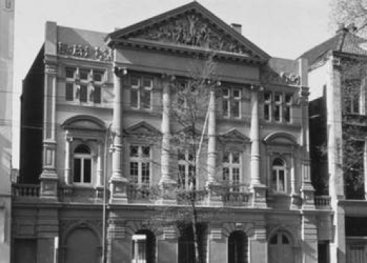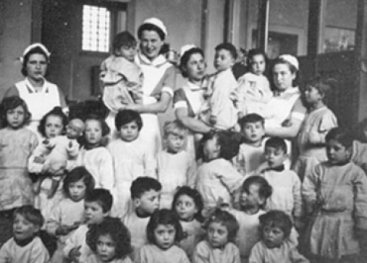
After the war
Many Jewish parents had been murdered in the camps. But around half of the children who went into hiding during the war, were able to return to their own fathers or mothers after the liberation. The parents were often in poor shape. They returned from the camps weakened and depressed. For many foster parents and children, saying goodbye was difficult.
Many children were fought over
What was to be done with children who no longer had any relatives? Could the child stay with the foster parents, or should he or she be placed with Jewish people so they can be raised in the Jewish traditions. Many children were fought over – by foster parents, relatives and representatives of the Jewish community. This was obviously extremely confusing for the children involved.
Those who were children then are old people now. But even though it may be 60 years ago, they still cannot comprehend that so many of their relatives were murdered. And that they were saved.
Huize Henriëtte
Of all the Jewish resistance workers in and around the former theatre Hollandsche Schouwburg and the day care centre, the only ones who failed to survive the war were the two principles, Henriette Henriquez Pimentel and Walter Süskind. The day care centre was reopened in a different location, in Sarphatistraat, in 1950. It was renamed Huize Henriëtte, after Henriëtte Pimentel. Virrie Cohen was made the new principal. One of the rooms is called ‘Room Yvonne’ after Walter Süskind’s daughter. The day care centre is closed in 2007.
War foster children
The Bureau for War Foster Children (Commissie voor Oorlogspleegkinderen - OPK) was founded immediately after the liberation. The OPK took charge of children whose parents had not returned. The people from the Trouw group played a large role in the organisation. Gesina van der Molen was appointed chairman of the OPK and Sándor Baracs the director. There was a lot of criticism of the OPK. They were accused of making too much effort in the interests of the – Christian – foster parents. About one-third of the children were placed with their foster parents. The majority of the orphans were placed with Jewish foster families or in Jewish orphanages.

Liesje with her mother (right)
after the war.
‘I made this plaque for my mother shortly after the liberation. We were reunited in August 1945. That was a very strange moment. She was so different from the mother in the photograph I had kissed goodnight every evening! She moved in with us, and that gave me the chance to get used to her again. We have always kept in close touch with my foster family, the Koopmans.’
Liesje de Hond

 'After the liberation, I stayed with beppe and omke (grandma en uncle ed.). I didn’t want to leave. My aunt tracked me down and came to Friesland. The moment she said my name, Salo, was such a shock that I fell ill immediately. In early 1946, I had to go back to Amsterdam, to live with my uncle and aunt. Beppe and omke came along the first week. When they went back home I had a difficult time. I only spoke Friesian and felt terribly lost. It took me a long time to settle in. I kept in touch with beppe and omke until they died.’
'After the liberation, I stayed with beppe and omke (grandma en uncle ed.). I didn’t want to leave. My aunt tracked me down and came to Friesland. The moment she said my name, Salo, was such a shock that I fell ill immediately. In early 1946, I had to go back to Amsterdam, to live with my uncle and aunt. Beppe and omke came along the first week. When they went back home I had a difficult time. I only spoke Friesian and felt terribly lost. It took me a long time to settle in. I kept in touch with beppe and omke until they died.’
Salo Muller
 ‘I often sat in the building shack daydreaming about the liberation. I would fantasise about a big fanfare on Dam Square in Amsterdam and that all the children who had been in hiding would walk behind them and that we would be received by cheering crowds... But that’s not how it happened. After a while I was able to return to Amsterdam. I went to live with my aunt. My parents and brother never returned and slowly I gave up all hope that they ever would. I tried to live as normal a life as possible.’
‘I often sat in the building shack daydreaming about the liberation. I would fantasise about a big fanfare on Dam Square in Amsterdam and that all the children who had been in hiding would walk behind them and that we would be received by cheering crowds... But that’s not how it happened. After a while I was able to return to Amsterdam. I went to live with my aunt. My parents and brother never returned and slowly I gave up all hope that they ever would. I tried to live as normal a life as possible.’
John Blom

‘After the liberation, it turned out that of my entire family, only two cousins had survived the war. The Bureau for War Foster Children asked one of those cousins what was to be done with me. After a meeting with my foster parents, my cousin was convinced I should stay with them. They were so loving towards me. It was true. I always called them my parents, ‘heit’ and ‘mem’ (dad and mum, ed.). When I was four years old, they told me they were not my real parents. I asked: “But where are they, did they live in this street?” “No,” my foster father said, “terrible things happened to them.”’
Foke Waterman

